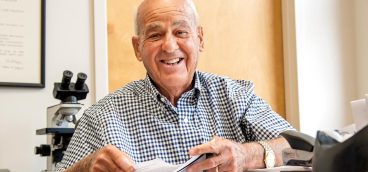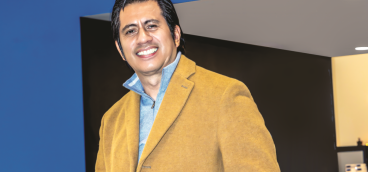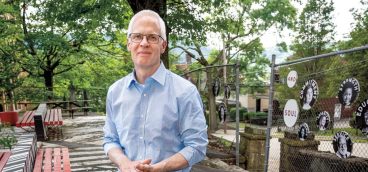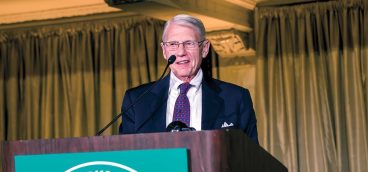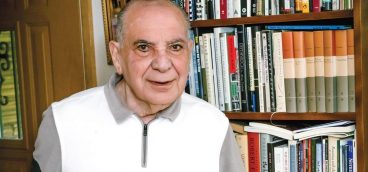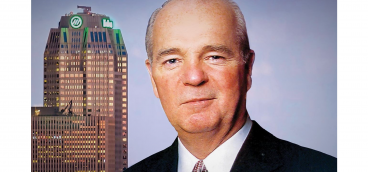Tuomas Sandholm: AI’s Benefits Far Outweigh its Dangers- Here’s Why

For Tuomas Sandholm, it’s no contest. The co-director of Carnegie Mellon University Artificial Intelligence (CMU AI) firmly believes the benefits of artificial intelligence far outweigh the downsides.
“AI can make better decisions than humans, which will make the world a better place,” he says.
To better understand his perspective, look at his track record.
In 2010, the Angel Jordan University Professor of Computer Science at Carnegie Mellon, one of many titles he holds, created pro bono the algorithm for the national kidney exchange. His techniques in algorithms are also behind the worldwide kidney exchange, which is credited with saving 10,000 lives to date.
The medical field is one of the biggest benefactors of AI now and in the future, he says. “A lot of the decisions are going to be AI-supported. For one, it’s hard for humans to absorb all the medical knowledge today. It’s too much! AI can scour through a lot of medical knowledge and treatment.”
Beyond that, AI can crunch vast amounts of data to arrive at holistic decisions that defy mere human intellect. “This is where organ allocation comes into play,” says Sandholm. “Individual doctors are only looking at one patient, or a few patients, at their transplant centers. They can’t make the best decisions from a national perspective. AI is able to look at the whole national perspective.”
In another AI milestone, this one dubbed “superhuman,” Sandholm led the team that developed the artificial intelligence program called Libratus that beat the world’s top four poker players. It took place in a marathon 20-day, no-limit Texas Hold ’em competition in 2017 at the Carnegie Science Center in Pittsburgh.
“It was a benchmark,” he says of the legendary poker battle, “representative of a much bigger class of strategic reasoning. It proved AI is better than humans at strategic reasoning. Since then, we’ve seen it in other applications as well, mostly multiplayer games like various defense strategies.”
Sandholm, of course, was already hard at work on them. He founded five companies, including Strategy Robot, a Pittsburgh-based company with a staff of 10 that built the software now used by the U.S. Department of Defense. He describes his company as “bringing game-theory paradigm to plan against adversaries. So far, we have only worked with U.S. customers, but we are open to working with other NATO countries as well.”
The company, Sandholm notes, is profitable without ever having any venture capital investment. A related company, Strategic Machine, which he also founded and runs, focuses on computational game theory for business applications. And another, Optimized Markets, optimizes ad sales, campaigns and the allocation of inventory and pricing for television, the internet and more.
In 2010, the serial entrepreneur sold one company, the highly successful CombineNet, for an amount he is under agreement not to reveal. The company sold again three years later for $43 million.
The innovative technology behind CombineNet allows customers to model complex scenarios using various objectives and constraints to discover optimal sourcing strategies. Simply put, it’s finding the best places to buy goods for the best prices and quality. The result? Achieving a much higher efficiency with significant cost savings.
An example is Proctor and Gamble, which optimized its inbound and outbound trucking services in North America by using the so-called combinatorial auctions to achieve maximum efficiency in its transportation routing, loading and scheduling.
With 29 patents and more than 500 academic papers to his name, the amiable professor is clearly at the top of his field, especially in the academic and research world of AI. When this is pointed out, he is quick to add, “With all the people who work in my startup companies.” For the record, he has hired at least 400 at his companies and in his research over the years.
Sandholm arrived in the U.S. as a grad student from Finland in 1992, landing at Carnegie Mellon in 2000 after stints in St. Louis and Los Angeles. He has many specialties in the AI sub-fields, mostly in game theory (think: crunching data to find the best strategy out of many options), strategic reasoning, and automated negotiation.
There’s more to note about the man. In 1986, he won the title of No. 1 windsurfer in Finland. The following year, he won the Finnish championship in the sport, which is wildly popular in Europe. He continues his love of racing on water as a member of the Moraine Sailing Club where he travels with his team for races.
He also served in the Finnish navy as a pilot. “In Finland, there was obligatory service,” he says when the subject is broached. He waits to be asked before divulging: “I flew a Vinka, a Finnish acrobatic robotic training plane” — which, he admits, was a ton of fun.
When asked if he has ever failed, he laughs and says, “Many, many times.” Pressed for an example, he ponders for a few beats and then says, “When we went against the Texas Hold ’em in 2015, we couldn’t beat them.”
True enough. But he turned that defeat into a resounding success by winning in 2017 when they “developed better algorithms.” The victory was hailed as a “superhuman milestone.”
While he’s a big proponent of AI and its proven capabilities for transforming our lives for the good, Sandholm cautions against the potentially bad AI outcomes. In his opinion, the worst danger emanates from large language models.
“Like ChatGPT,” he adds.
If you asked ChatGPT to define itself, here’s what it says:
“Large language models, like me, are advanced artificial intelligence systems designed to understand and generate human-like text. They’re built using vast amounts of text data and sophisticated algorithms. These models can understand context, generate responses, and even perform tasks like translation or summarization.”
Sandholm isn’t buying it. “People think that large language models are intelligent because they sound so convincing even though they’re hallucinating.”
Hallucinating is pretty much what it sounds like — the term for spouting stuff that’s not true. As an example, ChatGPT at one point declared Sandholm to be an expert in computer vision — a tidbit that was brought up by someone at a meeting he attended — but he is not, he says.
“It is often incorrect,” he says. “They will argue in well-written language that they’re right even if they’re wrong. That’s the kind of AI we need to be cautious about, and it’s becoming very popular.”
What’s being done to combat the misinformation?
“There’s a lot of nascent work, and we’re doing it as well, in trying to figure out how to avoid large language models from saying things you don’t want it to say — like, how to make a bomb, a classic example, and how to prevent hallucination.”
Although Sandholm has witnessed seismic changes brought by AI in his career, he has also witnessed big changes in Greater Pittsburgh since arriving more than two decades ago.
Look at his university alone, he points out: “At CMU, we’re number one in computer science together with MIT, Stanford and Berkeley. And in the AI sub-field of computer science, we are uniquely number one.”
He notes the presence of bigger tech companies in Pittsburgh now, such as Meta/Facebook, as well as his many colleagues and students working on various endeavors. “And my own company, of course,” he adds with a playful smile. “We’re hiring!”
For the gifted Sandholm, it was “very, very easy to get a visa” and move to the U.S. as a grad student. He arrived to study multiagent systems under Victor Lesser at the University of Massachusetts Amherst, after — not surprisingly — researching the best people in the field in that sector.
Would getting a visa for others in similar situations be the same today?
“For someone like me, it would be easy to get the visa because there are all sorts of programs that give priority to people with special expertise. If you’re a general programmer, especially from some country that the U.S. doesn’t like, that would be very difficult.”
In the competitive chase for talent, any city in the country — make that the world — would consider Tuomas Sandholm a catch of the highest caliber. His contributions to Carnegie Mellon and to Pittsburgh have been incalculable.
He remains an unabashed fan of Pittsburgh, although he wishes the city would work harder to clean up the air, which he believes impedes local companies’ recruitment efforts.
Sandholm lives happily in Shadyside with his wife, Christina Fong Sandholm, a Ph.D. senior research scientist in economics at Carnegie Mellon, and their two teenage daughters.
Their older daughter, he points out with pride, just got accepted into her university of first choice for the upcoming fall term: Carnegie Mellon.
Her major? Computer science.


